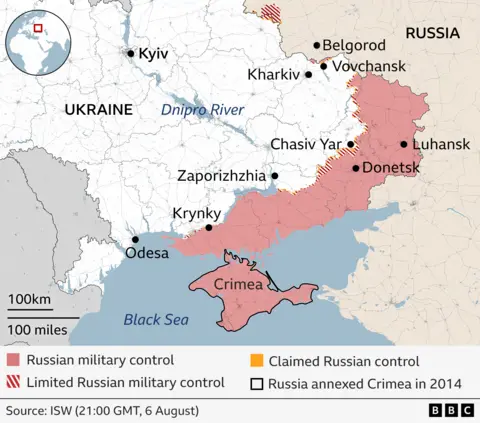
 Anadolu via Getty Images
Anadolu via Getty ImagesEuropean leaders have warned against Ukrainian borders being redrawn by force – two days before a US-Russia summit on Ukraine is due to take place in Alaska.
In a statement, European leaders said "the people of Ukraine must have the freedom to decide their future."
It added the principles of "territorial integrity" must be respected and "international borders must not be changed by force".
The statement was signed by 26 of 27 leaders. Missing from the signatories was Hungary's leader Viktor Orban, who has maintained friendly relations with Russia and has repeatedly tried to block EU support for Ukraine.
The statement underscored the nervousness felt by Europeans about Moscow's actions in Ukraine, which many countries – particularly those bordering Russia or those in which the memory of Soviet occupation still lingers – believe could pose a direct threat in the near future.
In recent years Sweden and Finland have joined Nato, Baltic countries have reinstated conscription, and Poland has set aside billions to build a barrier alongside its border with Russia.
European countries have a long history of borders being redrawn by bloody wars and are extremely concerned by the prospect of the US allowing that to happen in Ukraine. A legal recognition of Russia's sovereignty over territories it conquered by force is unacceptable to the EU.
However, the notion that some Ukrainian regions currently under Russian control may not return to Kyiv is gaining ground.
US President Donald Trump has insisted that any peace deal would involve "some swapping of territories" and could see Russia taking the entire Donbas region in eastern Ukraine and keeping Crimea. In exchange it would give up the Kherson and Zaporizhzhia regions, which it partially occupies.
Last week, while admitting that some Ukrainian territory might end up being de facto controlled by Russia, Nato chief Mark Rutte stressed that this should not be formally recognised.
In their statement, European leaders said "Russia's war of aggression against Ukraine has wider implications for European and international security", and stressed the need for a "just and lasting peace".
They also said Ukraine should be capable of "defending itself effectively" and pledged to continue providing military support to Kyiv, which was "exercising its inherent right of self-defence".
"The European Union underlines the inherent right of Ukraine to choose its own destiny and will continue supporting Ukraine on its path towards EU membership," the statement concluded.
Denting the apparent unity of the declaration was a line in smaller print at the bottom of the page pointing out that "Hungary does not associate itself with this statement".
In a post on social media its leader Viktor Orban said he had opted out of supporting the statement as it attempted to set conditions for a meeting to which the EU was not invited and warned leaders not to start "providing instructions from the bench".
He also urged the EU to set up its own summit with Russia – though EU leaders have been shunning direct talks with Moscow since it launched its invasion of Ukraine in February 2022.
On Monday Trump revealed he had sought Orban's advice over the chances of Ukraine winning against Russia on the battlefield. "He looked at me like, 'What a stupid question'," Trump said, suggesting that Orban felt Russia would continue to wage war until it beat its adversary.
EU leaders are due to hold talks with Trump on Wednesday. They will be hoping to put the security of the European continent and Ukrainian interests at the forefront of his mind – at a time when nervousness is growing that the peace imposed on Ukraine may end up being neither "just" nor "lasting".
Trump and his Russian counterpart Vladimir Putin are then expected to meet in Alaska on Friday.
